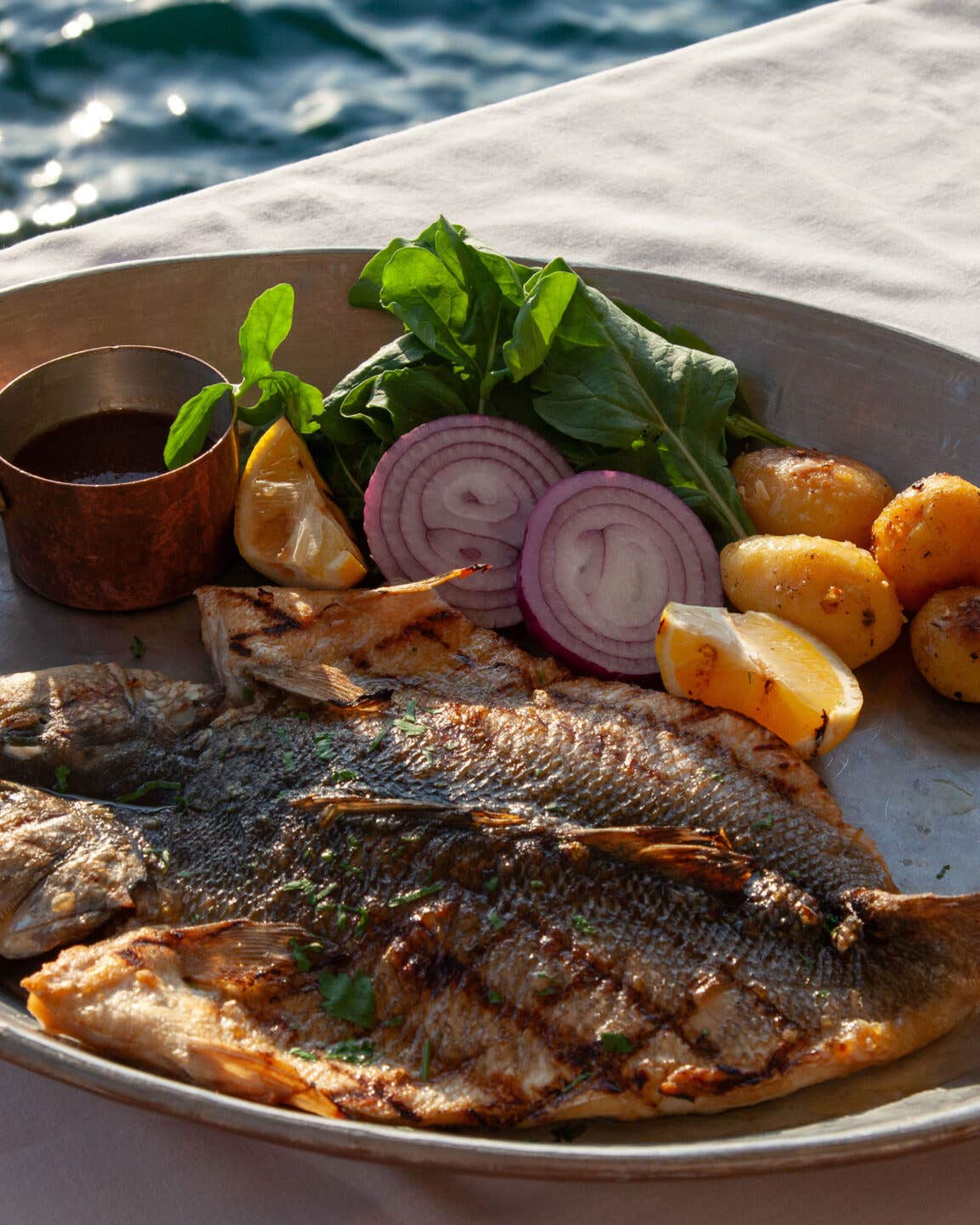
At the Water’s Edge (The Cyclades)
This archipelago extends from just off the southeastern coast of the mainland, near Athens, nearly to the Sea of Crete. Stark, sun-bleached, and scoured by ocean winds, the islands are mostly arid, with small tracts of arable land that yield tomatoes, pulses, and grapes. One of the islands, Santorini, is home to celebrated wines. But the Cyclades' greatest bounty comes from the sea: fresh and cured fish play a central role in the regional cuisine.
Bring fish!" That was the entirety of the text message I got from Aglaia Kremezi on the morning I was to visit her at her home on Kea, the northwesternmost island in Greece's Cyclades archipelago. At 8:00 a.m., I walked down to the waterfront in Korissia, Kea's port, and picked up a few sea bass at a fishmonger's shop facing the docks, where fishing boats were tying up to sell their morning catch. I paid for the sea bass and approached a sturdy wooden boat named Marigo; spilling out from wooden crates on the deck were dozens of glistening sea bream, along with the odd scorpion fish, barracuda, small tuna, and red mullet. I bought four sea bream that were still stiff with rigor mortis, a sign that they'd been pulled from the water just hours before.
If there's a paradise on earth for a seafood lover like me, it is Kea—more specifically, the outdoor kitchen where Aglaia, a journalist and cookbook author, runs a cooking school with her husband, Costas Moraitis. The week I spent there, learning the Greek way with fish, was like a waking dream. Every sun-drenched day began with a trip to the docks and from there flowed seamlessly from cooking to eating to cooking and back again. Always, we cooked with the freshest imaginable fish, often with little more than hot coals or a soup pot and some fresh garden vegetables or wild herbs.
On that first day, we grilled the sea bass and sea bream over hardwood coals in a brick grill built into a wall bordering the yard. After starting the fire, Costas snipped a few fig leaves the size of a catcher's mitt from a tree on the property and wrapped them around the bass. Not long after being laid over the coals, the leaves began to sizzle and sear, exuding a sweet, faintly caramelized aroma; soon the charred leaves had melded to the crisping skin. The dish, Costas told me, is a direct link to the ancient Greeks, who wrapped the belly of tuna in fig leaves and buried it with hot embers. We transferred the fish onto platters and Aglaia anointed them with ladolemono, a simple sauce of olive oil and lemon juice. We'd done next to nothing to this fish except apply fire, and it was one of the finest meals I could remember, taken in the shade of the house's terrace in the early afternoon. The bass's flesh was incomparably moist, protected and subtly sweetened by its fig leaf wrapping; I ate hungrily, dragging forkfuls through puddles of the sauce.
The next day at the docks we bought two 18-inch drakena, a firm-fleshed species I recognized as weever fish, as well as one fierce-looking moray eel. "Today, we'll make kakavia," Aglaia said; this classic Aegean fish stew, I'd heard, may be a forerunner of French bouillabaisse. Back in her kitchen, Aglaia fileted the weever fish and tossed its head and bones into a pot along with the eel, some white wine, oregano, fennel, and chopped onion. She let it all boil for an hour or so, until the gelatin in the eel flesh and fish bones had thickened and enriched the broth. Then she strained the liquid and added garlic, potatoes, carrots, zucchini, and the filets. "My mom used to mash the vegetables together to make it thicker," she said as she ladled the chunky soup into bowls, "but we just eat it like this." Once again, doing less to the food seemed to result in something greater.
The preparation of the grilled octopus we had for lunch a few days later was only slightly more complicated. The first step in the process had been done for us: the fisherman who'd sold us the octopus had already pounded the two-foot-long creature repeatedly against the dock to break down the proteins in its flesh. To finish the tenderizing process, Aglaia simmered the octopus in her kitchen. Then she marinated the tentacles in that holy trinity of Greek flavorings—olive oil, oregano, and lemon juice—for two days to let them become supple and flavorful. Finally, we grilled them quickly in the hearth over hardwood coals and rosemary branches and ate them with griddled pita topped with tomato sauce and feta, and grilled, rosemary-stuffed leg of lamb.
Over the course of a few days, my world seemed to shrink to the confines of Aglaia and Costas's yard. It was where we cooked (once, using a rustic coal-heated oven called a gastra), where we ate, where we picked the fresh herbs, dug the carrots, and cut the artichokes to accompany our meals. On one of the few occasions when we made an excursion to find an ingredient other than fish, Costas and I hiked down an old stone path to the remains of the ancient city of Karthaia, where we foraged for the wild capers that grow on bushes in the shadow of a ruined temple of Apollo, built in 530 B.C. On our way there, Costas pointed out a kathikia, a type of low-slung stone dwelling that many believe dates back to antiquity; it had an outdoor hearth that reminded me of the one we'd been using to cook our own meals.
When we got back to the house, Aglaia soaked the capers in a jar of brine to mellow their bitter edge and then started to butterfly the fresh sardines we'd bought that morning. "Use a dull knife so you don't pierce the back of the fish," she said before gently rinsing the fish with vinegar and laying them in a bath of olive oil, garlic, lemon juice, and parsley for a simple meze. "Poor man's food," she said as we sat down to eat.
On my last night, I decided to venture out to a nearby taverna for dinner. After I sat down, the owner appeared at my table and invited me back into the kitchen. There, nestled into crushed ice in stainless-steel sinks, were four kinds of fish. "Which would you like?" he asked. I wasn't receiving special treatment; Aglaia had told me it was common for guests to be allowed to pick their own fish. I pointed to two gleaming, six-inch-long red mullets. "Ah, barbounia," the owner said. "Grilled or fried?" I ordered them grilled and went back to my table to sip on a Mythos beer and gaze out at the marina, where the anchored boats of Kea's fishermen rocked silently in the waves.
Keep Reading
Continue to Next Story










